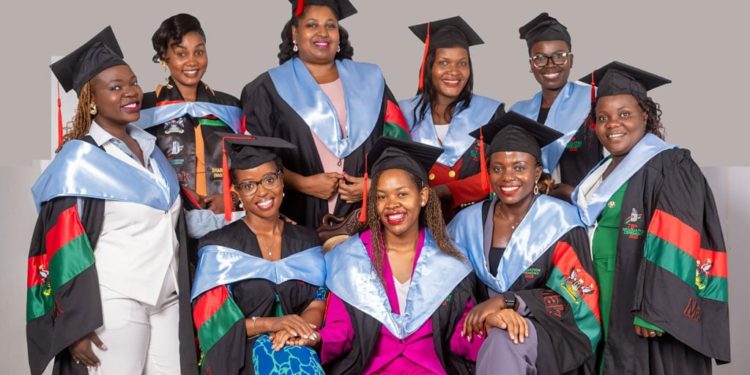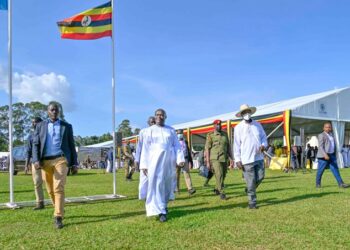Makerere University Journalism and Communication Department is celebrating a significant milestone as an increasing number of master’s students completed their studies within the recommended two-year timeframe.
Last year, only four students graduated within two years, while the rest extended their programmes for various reasons. However, this year, 14 students have achieved this feat and are graduating today, sparking excitement within the department. For years, there has been a persistent narrative that completing a master’s degree at this department within two years is nearly impossible.
Critics often advise prospective students to consider alternatives, citing prolonged delays at Makerere. This perception had led some students to pursue graduate studies abroad or at other universities within Uganda. Dr Aisha Nakiwala, the head of the Journalism and Communication Department, confirmed to Monitor that this year marks the first time the department has graduated up to 30 master’s students. Of these, 15 are pioneer students from the newly revamped programmes, who completed within the two-year timeframe, while 14 are from the old programme, which was phased out in 2022.
Dr Nakiwala explained that the department currently offers three master’s programmes: the phased-out Master of Arts in Journalism and Communication, and the new Master of Journalism and Multimedia and Master of Strategic and Corporate Communication, which were introduced in 2022. “The reason behind this success is our deliberate effort to attract highly motivated students and support them to enhance their completion rate,” Dr Nakiwala said.
“We ensured the students had a genuine passion for their field, which translated into dedication and the drive to succeed.” The department’s expertise and collaborations with institutions such as Norway’s Oslo Metropolitan University through the NORPART project also contributed to its appeal.
Student experiences
Among the students who have beat the two years’ time frame include Monitor’s Damali Mukhaye and Sharon Katusiime, who are graduating with master’s in strategic and corporate communication.
Others include the renown journalists and public relations officers like Sarah Kagingo, the vice chairperson of the Board of Private Sector Foundation of Uganda (PSFU); Ms Lyn Tukei, the communications and public relations manager at the Capital Markets Authority; Ms Cecilia Okoth, the senior communications officer at Child Fund; Ms Mildred Tuhaise, NBS TV presenter, and Ms Sharon Ibenu, the communications officer at Enabel, among others. Ms Mukhaye highlighted that the revamped programme allowed students to focus on coursework during the first year and dedicate the second year entirely to research.
“Unlike the previous structure where research was squeezed into one semester, the new structure gave us enough time to delve into our projects,” she said, adding that resilience, teamwork, and her bosses and supervisors’ support were instrumental in their success. Ms Katusiime attributed her timely completion to determination, a strong support system, and teamwork among peers. “We encouraged each other, met to discuss, and shared knowledge to the finish line. Teamwork truly made the dream work,” she said.
Ms Tukei credited her success to passion, mentorship from Dr Nakiwala and the department support. Her research explored online personal branding and its impact on organisational perception, citing her findings as vital for small enterprises seeking visibility. Ms Okoth described her cohort as exceptional, with a spirit of Ubuntu (togetherness). “We supported each other through challenges, ensuring no one was left behind,” she said, praising her super[1]visor’s guidance and her employer’s pro-education stance.
Ms Kagingo said completing the rigorous master’s programme in two years, despite everything on her plate, was an absolute relief. “As we advocate for effective communication for development, it’s key to emphasise integration of strategic communication at inception of programmes. The shift can bridge the gap between policy and public understanding, ensuring initiatives are both impactful and sustainable to achieve long-term goals,” Kagingo said.
The department in 2022 phased out master’s in journalism and communication after receiving a red flag from the National Council for higher education. The department split the programme into two programmes: Master’s in strategic and Corporate Communications and Journalism and Multimedia.
The pioneer students of the above new programmes, with 12 from Communication and three from Journalism, will graduate today alongside the students who were doing the old programme but failed to complete it on time before it was dropped. The graduation ceremony that started on Monday, ends today with students from the College of Agricultural and Environmental Sciences (CAES), Engineering, Design, Art and Technology (CEDAT), and Humanities and Social Sciences (CHUSS) graduating.







Discussion about this post